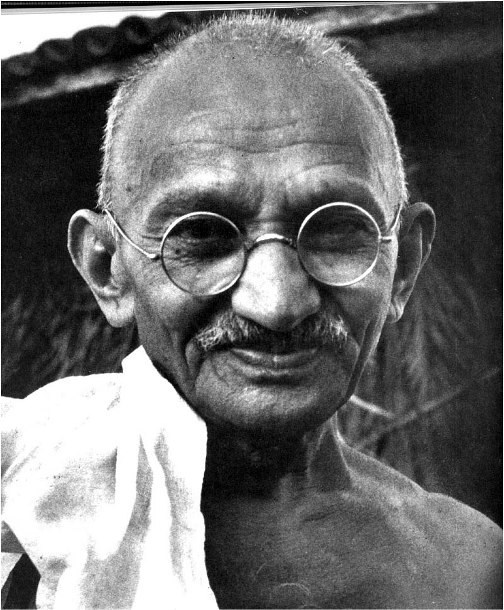 |
| Mohandas Karamchand Gandhi (http://en.wikipedia.org/wiki/File:MKGandhi.jpg ()) |
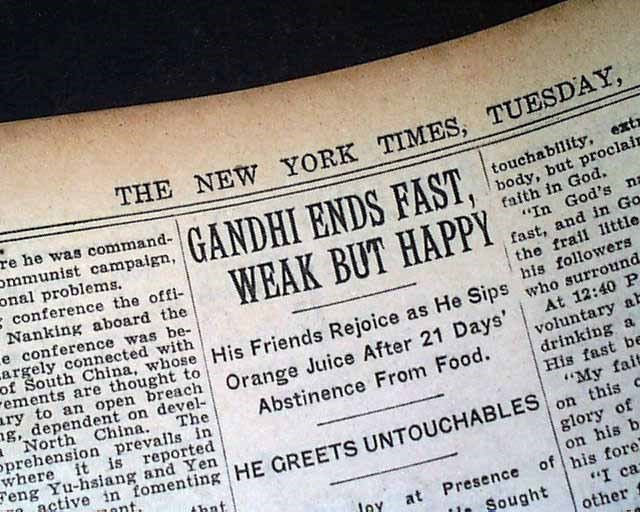 |
| Gandhi ends his 21-day fast (http://www.rarenewspapers.com/view/580152 ()) |
Mahatma Gandhi was a mighty tornado that swept through the nation with his determination to fulfill the nation's strong desire for sovereignty. He disconcerted the British with his fearless struggle for Indian independence; Gandhi was gaining more and more supporters along the way. "He was not ready to give up the fight, however, and soon Indians throughout the country were expressing support for the movement" ("Gandhi, Mahatma"). This quote demonstrates the power of Gandhi's determination towards ending his country's longing for home rule. Gandhi refused to surrender to the British; instead he kept the fight going. Although Gandhi was primarily focused on achieving the ultimate goals of Indian independence, he did have other missions. "He firmly believed that Hindu-Muslim unity was natural and he undertook a twenty-one day fast to bring the two communities together" ("Gandhi, Mohandas"). This quote shows Gandhi's resolve to forge good relations between two constantly fighting religions together. Gandhi resolutely stood for interreligious solidarity and he wanted to end Hindu-Muslim rivalry. Mahatma Gandhi's tenacious acts not only brought him support from the Indians; it also led him to bring two religions together. His determination, however, also brought him to act on internal problems in India.
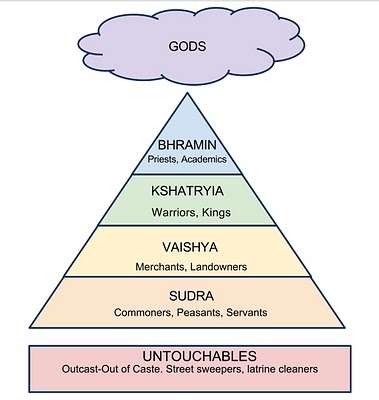 |
| The caste system in India (http://nataliepeart.wordpress.com/2011/10/23/hindu ()) |
Mahatma Gandhi selflessly devoted his entire life to improving the lives of others. Gandhi felt that Hindu society needed immediate and urgent reforms, so he dedicated himself to amending Hindu society. "Gandhi devoted the years 1934 through 1939 to the promotion of making fabric, basic education, and making Hindi the national language" ("Gandhi, Mohandas"). Gandhi saw that people all around him were not living a desirable lifestyle. He worked intently on changing the privileges people in India received, especially a basic education for everyone. Gandhi's self-sacrifice also brought him to reform one of India's oldest traditions: the caste system. The British created the caste system so as to rule by their policy of "divide and rule". It was a system of power and labor in society. One's caste determined their job and political power. "[A] cause Gandhi supported was improving the status of member of the [lowest] caste, or Harijans" ("Gandhi, Mohandas"). The caste system consisted of four levels. They were: the Brahmins, or priests; the Kshatriyas, the warriors; the Vaishyas, the traders and farmers; and the Shudras, the servants. However, the Untouchables were, in effect, omitted from the caste system. They were considered to be the lowest of the low, performing menial tasks, such as cleaning streets and working in mortuaries. However, Gandhi felt that they were still human beings, and he coined the term, "Harijans" meaning "children of God", to describe them. He worked tirelessly to lift them out of their poverty-ridden lifestyle, without thinking once that, as a Vaishya, coming into contact with an Untouchable was regarded as highly inadmissible. Even members of the higher castes loved and respected him for his selflessness. His humanitarian acts improved most people's lives and gained him even more support. Yet it wasn't just Gandhi's thousands of supporters that brought him victory; it was something that took the struggle for freedom to another level.
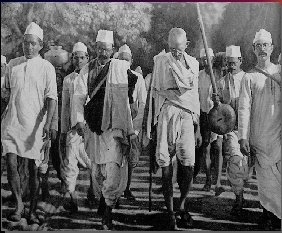 |
| Gandhi and his followers on the Dandi March (http://freeindia.org/freedom_fighters/page2.htm ()) |
Through his quiet civil disobedience, Mahatma Gandhi showed the British ruler that his nonviolence was more powerful than their wars and weapons. Gandhi strongly believed in love, forgiveness, and peace. He followed these principles by organizing peace protests. "Gandhi developed several methods of protesting, including mass marches and fasting" ("Gandhi, Mahatma"). Gandhi peacefully organized marches to nonviolently protest the British. These marches were long and tiring, but Gandhi and his followers did not stop. Gandhi also fasted for lengthy periods of time to impress upon people the need for love and nonviolence. Gandhi led countless marches, but the most famous march was the Dandi march, or the Salt Satyagraha. "In 1930, he [Gandhi] led a landmark 320km/200mi march to the sea to collect salt in a symbolic defiance of the government monopoly" ("Mahatma Gandhi"). Gandhi was unhappy with the amount of control the government had; it was taxing simple goods such as salt. Gandhi organized a 320 km march to the sea, so that his followers could collect their own salt from the salty seawater, thus protesting government tax. Gandhi's nonviolent tactics proved to be more effective than British weapons. His marches and fasts encouraged more and more people to love and forgive. Gandhi's nonviolence later inspired other peaceful civil rights movements around the world, such as Martin Luther King, Jr.'s struggle for equality.
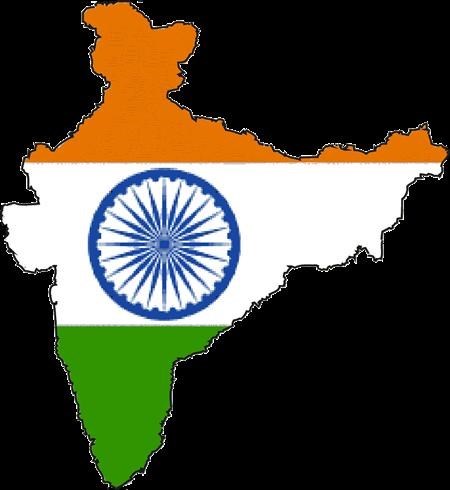 |
| (http://reasonsoflife.wordpress.com/indian-flag-its ()) |
Mahatma Gandhi was not only a dutiful Indian of exemplary character; he is an amaranthine figure of concentrated determination, unceasing selflessness, and pure nonviolence. Mahatma Gandhi was undeterred in his decision to defeat the British and make India a self-ruling country. He was a self-sacrificing man who cared more for others than himself. Gandhi preached satyagraha, or power of truth, because he believed that there was nothing more supreme than the truth. Following satyagraha meant practicing ahimsa, or nonviolence, while pursuing the truth. Gandhi never gave up, which shows how he is an inspiration because you can never accept defeat to achieve your goals. Gandhi was also charitable and benevolent. He inspires me to always think about others before myself. Gandhi once said, "An eye for an eye makes the whole world blind" ("Gandhi, Mohandas K."). His golden words show that he believed that there was always a peaceful solution to any problem. This shows that Gandhi taught a valuable lesson, because usually people choose to settle their differences by means of violence. However, Gandhi's nonviolent principles encourage us to think and act peacefully. Gandhi was able to successfully guide the Indians on their arduous journey to independence. Finally, after over 150 years, Gandhi's determination, selflessness, and nonviolent principles brought the chapter of the British Raj to a close.
Page created on 1/9/2013 12:00:00 AM
Last edited 1/9/2013 12:00:00 AM
